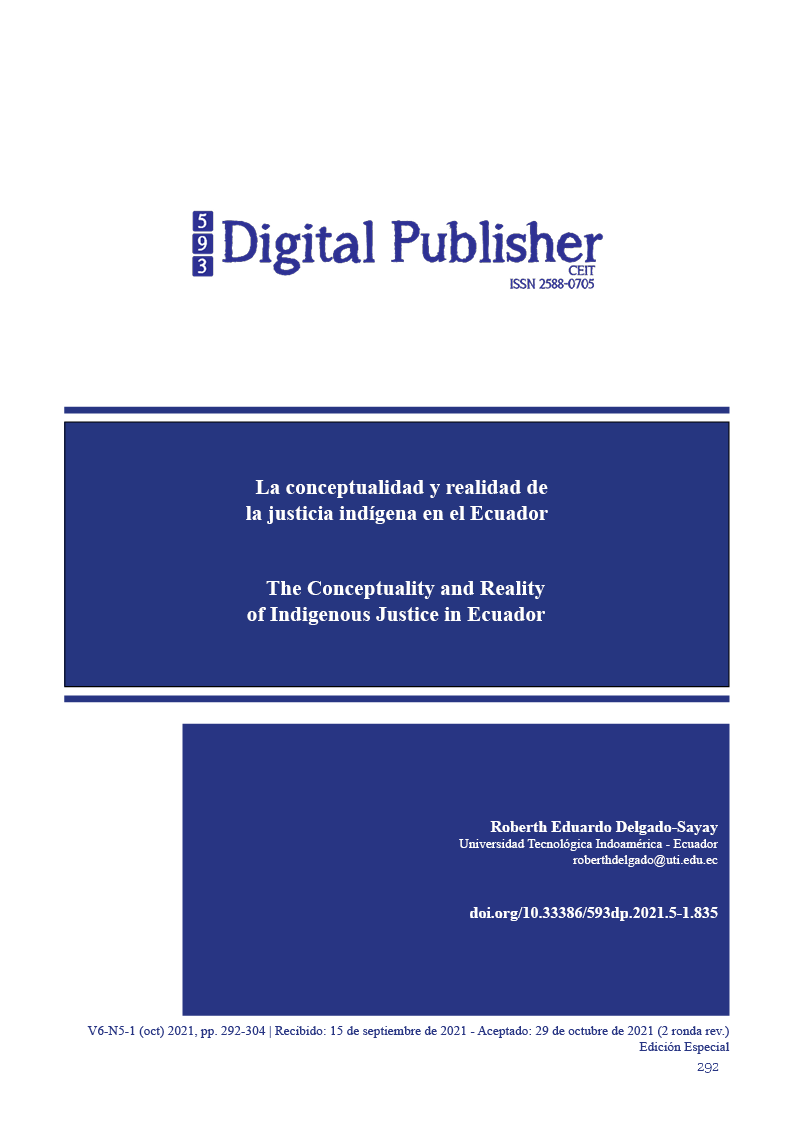The Conceptuality and Reality of Indigenous Justice in Ecuador
Main Article Content
Abstract
In the Ecuadorian State, not only since the 2008 constitution in force until today, the right to the administration of justice of the indigenous collectivities through their own authorities is recognized, being this subject of the analysis of this article and is one of the issues that requires special attention and treatment given the disadvantageous situation in relation to the prevailing ordinary justice within the national territory. Within the unitary state as it is configured in Ecuador, the presence of jurisdictional systems including a system of alternative justice for the resolution of conflicts is very useful even to decongest the administration of ordinary justice given the high demand for judicial processes.
In this work, when approaching the exercise of the indigenous justice administration, the analysis of primary and secondary sources with emphasis on the constitutional regulations, international and legal instruments, at the same time the actual praxis of these processes is evidenced, whose panorama is not at all encouraging since this millenary system has not been fully developed.
Downloads
Article Details

This work is licensed under a Creative Commons Attribution-NonCommercial-ShareAlike 4.0 International License.
1. Derechos de autor
Las obras que se publican en 593 Digital Publisher CEIT están sujetas a los siguientes términos:
1.1. 593 Digital Publisher CEIT, conserva los derechos patrimoniales (copyright) de las obras publicadas, favorece y permite la reutilización de las mismas bajo la licencia Licencia Creative Commons 4.0 de Reconocimiento-NoComercial-CompartirIgual 4.0, por lo cual se pueden copiar, usar, difundir, transmitir y exponer públicamente, siempre que:
1.1.a. Se cite la autoría y fuente original de su publicación (revista, editorial, URL).
1.1.b. No se usen para fines comerciales u onerosos.
1.1.c. Se mencione la existencia y especificaciones de esta licencia de uso.
References
Asamblea Nacional. (2021, mayo 17). Código Orgánico de la Función Judicial. https://app.vlex.com/#search/jurisdiction:EC/codigo+organico+de+la+funcion+judicial/WW/vid/631472775
Asamblea Nacional Constituyente. (2021, enero 26). Constitución de la República del Ecuador. https://app.vlex.com/#search/jurisdiction:EC,EA/constitucion+de+la+republica+del+ecuador/WW/vid/631446215
Asamblea Nacional. (2020, junio 22). Ley Orgánica de Garantías Jurisdiccionales y Control Constitucional. https://app.vlex.com/#search/jurisdiction:EC/Ley+Org%C3%A1nica+de+Garant%C3%ADas+Jurisdiccionales++y+Control+Constitucional/WW/vid/643461681
Cabanellas, G. (2012). Diccionario de Ciencias Jurídicas. Buenos Aires: Heliasta S.R.L.
Castro Riera, C. (2017). Temas de Filosofía del Derecho. Quito: Corporación de Estudios y Publicaciones.
Merino Sánchez, W. (2014). Derecho Penal Parte General. Quito: Editorial Jurídica del Ecuador.
Morán Sarmiento, R. (2012). El Código Orgánico de la Funcion Judicial y su incidencia en el Procesalismo Civil. Perú: Edilex S.A.
Organización Internacional del Trabajo, Internationale Arbeitsorganisation, & ILO (Eds.). (2009). Convenio Núm. 169 de la OIT sobre pueblos indígenas y tribales en países independientes: Declaración de las Naciones Unidas sobre los Derechos de los Pueblos Indígenas. OIT.
Oyarte, R. (2016). Derecho Constitucional. Quito: Corporación de Estudios y Publicaciones.

